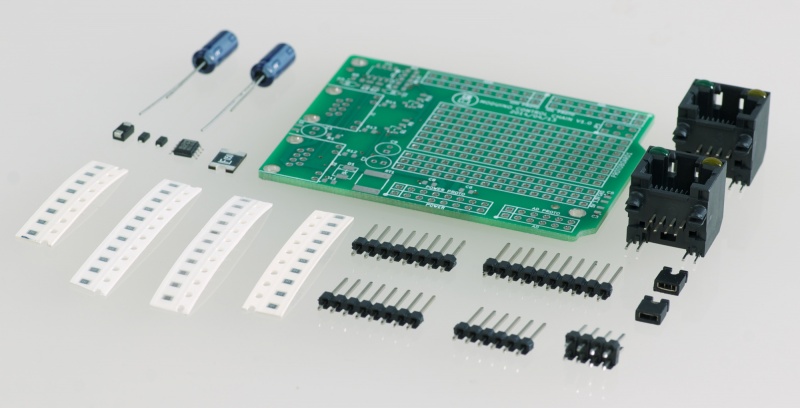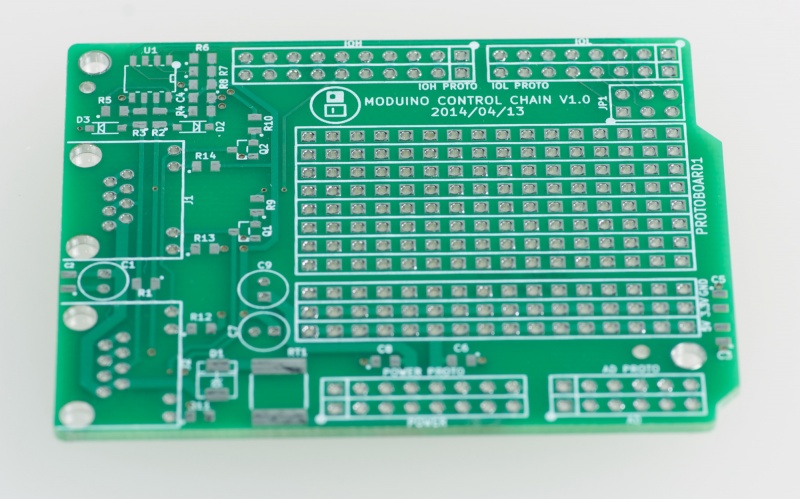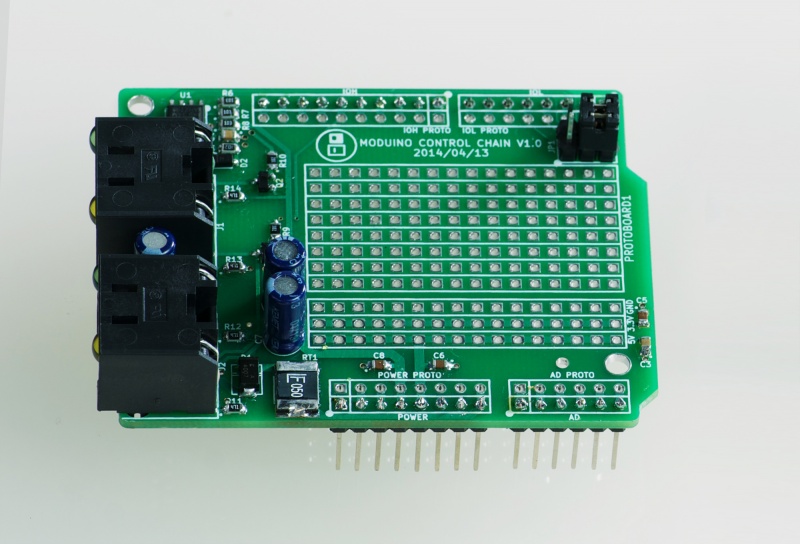Difference between revisions of "MOD Arduino Shield"
m (→Tutorial) |
m (Fix Github URL) |
||
| (5 intermediate revisions by 2 users not shown) | |||
| Line 24: | Line 24: | ||
<br clear=all> | <br clear=all> | ||
== Hardware Project Files == | == Hardware Project Files == | ||
| − | [https://github.com/portalmod/mod-arduino-shield/tree/master | + | [https://github.com/portalmod/mod-arduino-shield/tree/master MOD Arduino Shield Hardware Files] |
== Images == | == Images == | ||
| Line 33: | Line 33: | ||
[[File:MOD-Arduino-Shield-Assembled.jpg|800px|thumb|center|MOD Arduino Shield Prototype 1 Assembled]] | [[File:MOD-Arduino-Shield-Assembled.jpg|800px|thumb|center|MOD Arduino Shield Prototype 1 Assembled]] | ||
| + | == Tutorials == | ||
| − | + | * [[Arduino Basic Tutorial|Basic Tutorial]] | |
| + | * [[Arduino distance sensor tutorial|Tutorial: Distance sensor]] | ||
| + | * [[Arduino LiquidCrystal tutorial|Tutorial: LiquidCrystal]] | ||
| + | * [[Arduino Wireless tutorial|Tutorial: Wireless devices]] | ||
| − | + | [[:Category:Arduino_Shield_Tutorials|See all tutorials]] | |
| − | |||
| − | + | == External references == | |
| − | + | https://maker.pro/ - an active, open source platform for maker projects much like Hack A Day. These projects are centered around Arduino, Raspberry Pi, Intel Edison, home automation and more. And better yet, the content is completely user generated. | |
| − | |||
| − | + | https://www.allaboutcircuits.com/ - extremely active electrical engineering online community that provides both interesting content and useful resources for Electrical Engineers. | |
| − | |||
| − | |||
| − | |||
| − | |||
| − | |||
| − | + | https://eepower.com/ - digital publication focused on the power electronics industry. The publication features technical articles, design tips, and application notes from the industry’s leading power electronics engineers and application experts. | |
| − | |||
| − | + | https://www.electronicspoint.com/ - extremely active electrical engineering online community that provides both interesting content and useful resources for Electrical Engineers. | |
| − | |||
| − | |||
| − | |||
| − | |||
| − | |||
| − | |||
| − | |||
| − | |||
| − | |||
| − | |||
| − | |||
| − | |||
[[category:Arduino|shield]] | [[category:Arduino|shield]] | ||
Latest revision as of 17:15, 8 January 2022
We introduce the MOD Arduino Shield. A shield that enables the Arduino to interface with MOD through our Control Chain.
The MOD Arduino Shield was designed to help developers and hackers who wants to create their own effects controllers for MOD.
The main idea is that, with little effort, anyone can design and assemble the electronics of any sensor, integrate with Arduino and then with MOD.
Copy and paste some lines of code, solder some components on the breadboard, and easily have your own controller of MOD effects.
The MOD Arduino Shield is compatible with Arduino UNO, Arduino MEGA and Arduino DUE.
This project is open hardware! All the project files, not only the schematics and gerber, are open and available in our Github. We are using KiCad, also an open source software, for developing our boards and cases schematics. All the components are listed in the bill of materials with links for the general suppliers.
And it is also open software. We developed an Arduino Control Chain library that will do all the hard work so developers can easily implement their own cases.
We will present here some successful cases and help you with your development. The cases will come with electronic schematics, tested code examples, bill of materials, images and manuals.
But the MOD Arduino Shield is not restricted by these cases.
We have ideas of hacking a scale and use the weight sensor to control the distortion, a heart beat monitor that controls the delay of the sound, and even brain waves monitor for controlling the MOD. It goes way further.
The cases here are supposed to be cheap and easy, so if it gets difficult, let us know! (subscribe on developers list)
Hardware Project Files
MOD Arduino Shield Hardware Files
Images
Tutorials
External references
https://maker.pro/ - an active, open source platform for maker projects much like Hack A Day. These projects are centered around Arduino, Raspberry Pi, Intel Edison, home automation and more. And better yet, the content is completely user generated.
https://www.allaboutcircuits.com/ - extremely active electrical engineering online community that provides both interesting content and useful resources for Electrical Engineers.
https://eepower.com/ - digital publication focused on the power electronics industry. The publication features technical articles, design tips, and application notes from the industry’s leading power electronics engineers and application experts.
https://www.electronicspoint.com/ - extremely active electrical engineering online community that provides both interesting content and useful resources for Electrical Engineers.



